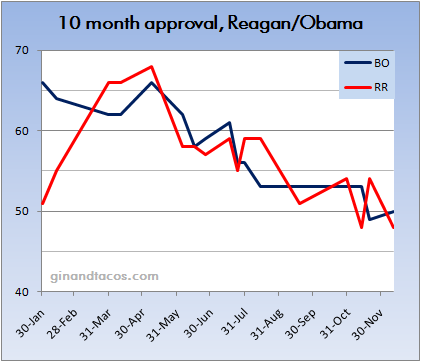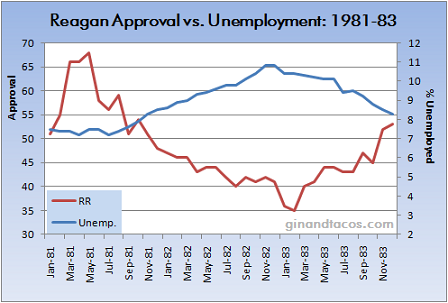I don't have the patience or energy to tear into this in depth, but today's Right Wing Histrionic Talking Point of the Day is less amusing and more infuriating than usual. Don't you know, the AP poll that gave Obama a 60% approval rating is a result of "poll cooking" by the AP. According to the polling experts at Newsbusters. And comment sections on your local newspaper website.
Apparently the fact that the sample in the AP poll (n = 1001) did not contain the exact same number of Republicans and Democrats – that's what polls are supposed to have, after all! – is de facto evidence that AP is rigging the numbers. The poll in question had 46% Democratic identifiers and 29% Republicans. The chicanery is obvious. Pant-shitting rage ensues.
The response is unsurprising, since that is exactly how someone who knows dick about polling would interpret this.
The 46% is just about what we would expect for Democrats + Leaners. The 29% for Republicans + Leaners is lower than I would expect. In a different AP poll conducted this spring, the split was 43% D to 40% R. That's the kind of variance one gets when taking a random sample of 1000 people in a country with 200,000,000 adults. Random sampling is absolutely fundamental to polling, and the word "random" means that sometimes we will get results that are not precisely what one would expect.
Let's say there are 100,000 poker chips in a bag – some unknown mix of red and black. We mix them up so they are completely random. We don't want to count all of them so we select 500 at random to estimate the red-black mix. We find 300 black and 200 red. Therefore we conclude that the bag contains 60% black and 40% red, plus or minus a margin of error of about 5% (i.e. we are 95% certain that black chips are between 55% and 65%, but the best guess is around 60%). That is how a random sample works.
Now let's say that you call 1000 people using a random phone dialer, 600 of whom are "red" and 400 of whom are "black". But you're convinced that the bag actually contains more black chips, so you pull out a few hundred more chips, throw out all the new red ones, and add more black chips to the original sample. That is how a manipulated, biased, and egregiously fucked-with sample works.
If 35% of the population is Republican and 40% are Democrats, we would EXPECT a random sample to have 35% R / 40% D. Right? Right. And if I flipped a quarter 100 times we would EXPECT to get 50% heads, right? Right. But will I get exactly 50 heads every time I flip a quarter 100 times? Nope. I might get 51. Or 47. If I do it enough times I might even get a wacky result like 37 heads. It's random. Raaaaaaaaaaandom. That means each outcome is totally independent of the one prior. A probability is merely an expectation. A random sample of 1000 people in an electorate with 200,000,000 voting-age adults is going to vary from our expectations, sometimes considerably.
That's why polls have…margins of error. The AP poll in question has a MoE of +/-4.4%. The MoE creates a 95% confidence interval, so the data actually tell us that we are 95% certain that Obama's approval is between 56% and 64%. There is only a 5% chance that his rating is higher or lower than that. Now, if reality is on the low end of that interval, would 56% really be so surprising? He has been hovering at 50% for a while, occasionally popping up to 51-52 or dropping to 45-48. A little bin Laden bump to 55-58 wouldn't be so shocking, would it?
It would be if you're Newsbusters and, among other things, you don't understand a random sample or margins of error.
Idiots. The lot of them.



